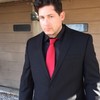Tim Tyler. Photo via Wikimedia Commons
Advertisement
Advertisement
Advertisement
"I went right back dealing to my Florida friends," Tyler says. "One of them beeped me all night when I had just flown in with a gram. He wanted a tenth. I gave 1300 hits to him. The narcotic officers came in two van-loads at 3 AM in the morning with black masks on. It was like in the movies."The feds were going after LSD dealers with a passion. (It's still a schedule one drug according to the United States government, by the way, making it a priority for DEA agents and narcotics cops.)"They brought me in a room and I told them I considered LSD a sacrament, and I would never help them in anyway," Tyler says. "No formal charges were filed and they released me on my own recognizance. I traded some paper for a car, got a friend to register it, and we went on tour."Tyler was now in full Deadhead outlaw mode, running from the cops and the court cases piling up against him."I blew both of those cases off for two years," he says. "When they finally caught me again in Florida, they offered me 18 months in prison, or three years probation to plead guilty. I pleaded guilty and then went to take care of the other case. They eventually gave me three more years concurrent probation after I requested a speedy trial. I also had a failure to appear on top of it all, and they gave me probation for that, too."Tyler was now in full Deadhead outlaw mode, running from the cops and the court cases piling up against him.
Advertisement
Advertisement
And so began Tyler's long, strange trip inside the belly of the beast. At the age most kids are graduating from college, he was looking at life in the federal pen. A gregarious Deadhead surrounded by brutal gangsters, thugs, bank robbers, and drug dealers, Tyler's seen his share of sticky situations. Still, he endures."I am optimistic that the president will step in and help. He has done it for some people that I know. Maybe this year I can get a break." -Tim Tyler
Tim Tyler in prison. Photo courtesy Tim Tyler
Advertisement
